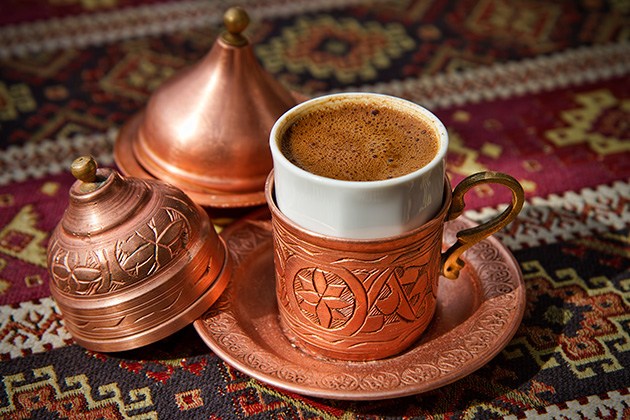"Turkish Coffee" you don't know-- an ancient drink with multiple roles

Professional barista communication, please pay attention to coffee workshop (Weixin Official Accounts cafe_style )
In the previous article in this series, The Construction and Making of Turkish Kettles, we introduced the simple brewing procedure of Turkish Kettles. Turkish coffee is often called "the oldest" name, it is not only the pioneer of human drinking coffee, but also plays an important role in introducing coffee to Europe, and the elegant appearance has become a collection of many coffee players.
This Goat Coffee will explore the history and evolution of Turkish coffee with you and uncover the mystery of Turkish coffee.
Origin of Turkish Coffee
Turkish coffee, or Arabic coffee, is also known as Greek coffee because of some historical origins.
It uses a traditional original brewing method, coffee powder and water mixed repeatedly boiled, and the most unique thing is to drink together with coffee grounds, and the coffee grounds left at the bottom of the cup can also be used for divination, also known as "divination coffee". It takes a relatively long time to brew and is rare in many areas.
The Turkish pot "Ibrik" gradually became popular in the 19th century. It is shaped like a spoon and the body is made of brass or pure copper. In the Middle East, camels are mostly used as transportation vehicles, so in order to be convenient to carry, there are also folding Turkish pots, which can be hung on camels and enjoy a cup of coffee anytime and anywhere.
Role in the Middle East
Coffee brewing in the Middle East is as discreet as China's reverence for the tea ceremony. If invited to someone else's home for coffee, it means that the host extends the highest degree of hospitality. There are also a lot of "eyebrows" to pay more attention to in drinking, such as drinking with water may mean that coffee is not good to drink. Arabs add a little spice and even cleanse themselves and burn incense when drinking coffee.
Turkey and Greece also value the foam surface of coffee, ancient men come to propose, women often test their coffee brewing technology, if not boil foam, often on behalf of technical deficiencies. There is also another saying that Turkish women will add flavor when brewing coffee when expressing their feelings, adding sugar to show congenial feelings, and adding salt to let the other party know difficulties and retreat.
from Turkey to Europe.
After the Arabian Peninsula became a dependency of the Ottoman Empire, coffee was gradually introduced from Arabia to Istanbul, Turkey's largest city, because Yemen also produced coffee. Coffee shops quickly spread and became popular in the Arab world. In the next ten years, coffee shops appeared in major cities such as Cairo, Baghdad, and even Constantinople, the capital of the Ottoman Empire.
There is a saying that in the sixteenth century, the Ottoman Empire defeated Vienna and retreated, leaving coffee beans as a turning point for coffee to be introduced into Vienna.
Coffee was originally regarded by some Catholics as "the devil's drink," but because of its delicious taste, Pope Clement VIII made it a "blessed drink." After the introduction of Venetian merchants, coffee was regarded as a cultural symbol of the European city in the 17th century.
At the beginning of the eighteenth century, coffee houses had become a place of humanistic convergence for the dissemination of knowledge.
Related Articles: History of Italian Coffee (Part 1): The Blessed Drink
Murad IV banned coffee
Coffee houses became places for political and social discussion and had a great impact on the social atmosphere.
The Ottoman Emperor Murad IV was born in 1612 and was known as the "irritable" king because of his violent nature. During a visit to a coffee shop in Istanbul, he found that many people were talking about politics and criticizing his administration, which made him very unhappy, so he decided to ban coffee. This caused the coffee shops in Istanbul to disappear, and not only the coffee drinkers would be punished, but the merchant ships carrying coffee beans would also be sunk.
Sultan Murad IV
Murad IV banned coffee, mainly because of fears that coffee would revolutionize people's thinking, which was the first political opposition to coffee and the first non-religious suppression of coffee.
Islamic historians describe the scene as "the desolation of cafes, like the drying up of people's hearts," and it was not until the death of Murad IV that cafes in Arabia reappeared. As a result, considerable coffee and people's lives have been inseparable, and the coffee shop culture formed has brought great influence.
Turkish Coffee Selected for United Nations Cultural Heritage
In 2013, UNESCO (Note 1) included Turkish coffee and its traditional culture in the list of intangible cultural heritage at the meeting of the Intergovernmental Committee for the Safeguarding of Intangible Cultural Heritage.
This has extraordinary significance for the maintenance of Turkish coffee. Turkish coffee is the ancestor of European coffee. It has a history of seven or eight hundred years. It has been commercialized since it was introduced into Europe in the 16th century. Whether it is cup decoration or brewing methods, it can be seen that it is influenced by Ottoman culture.
Note 1: United Nations Educational Scientific and Cultural Organization (UNESCO)
Have a cup of Turkish coffee and remember your 40 years of friendship.
This is an old Turkish saying, and the locals take the art of coffee very seriously and value the process and object of brewing. When we look back on the history of coffee, Turkish coffee has an indelible historical position and has become one of the symbols and symbols of Turkey.
Important Notice :
前街咖啡 FrontStreet Coffee has moved to new addredd:
FrontStreet Coffee Address: 315,Donghua East Road,GuangZhou
Tel:020 38364473
- Prev

He went to Starbucks to see "this scene" and scolded angrily: the most beautiful scenery in Taiwan is selfishness.
Exchange of professional baristas Please pay attention to the Coffee Workshop (Wechat official account cafe_style) Starbucks holds activities from time to time, always attracting thousands of customers to wait in line to buy coffee, but some netizens really can't bear to watch this kind of time, which is even noisier than the construction site and the market! ▼ (photo / unified Starbucks coffee and Facebook) netizens are at
- Next

"World Bean Baking Champion: Lai Yuquan" becomes a romantic fool to create personal coffee taste!
Professional baristas Please follow the Coffee Workshop (official Wechat account cafe_style) after the first prize of the World Coffee Bean roasting Competition was announced in 2014, Lai Yuquan shouted excitedly: I am from Taiwan. Jacky Wu, from Ilan, Taiwan, modestly says that he is not enough to represent Taiwan, but can only say that he is from Taiwan. With such humility, he has great enthusiasm and dreams for coffee.
Related
- Can lightly roasted coffee beans be used to extract espresso? How finely should you grind high-quality coffee beans to make Italian latte?
- What is the difference between the world's top rose summer coffee and Yejia Shefi? What are the flavor characteristics of Yega Shefi coffee and Panama rose summer?
- The ceremony is full! Starbucks starts to cut the ribbon at a complimentary coffee station?!
- A whole Michelin meal?! Lucky launches the new "Small Butter Apple Crispy Latte"
- Three tips for adjusting espresso on rainy days! Quickly find the right water temperature, powder, and grinding ratio for espresso!
- How much hot water does it take to brew hanging ear coffee? How does it taste best? Can hot water from the water dispenser be used to make ear drip coffee?
- What grade does Jamaica Blue Mountain No. 1 coffee belong to and how to drink it better? What is the highest grade of Blue Mountain coffee for coffee aristocrats?
- What are the flavor characteristics of the world-famous coffee Blue Mountain No. 1 Golden Mantelin? What are the characteristics of deep-roasted bitter coffee?
- Can I make coffee a second time in an Italian hand-brewed mocha pot? Why can't coffee be brewed several times like tea leaves?
- Hand-brewed coffee flows with a knife and a tornado. How to brew it? What is the proportion of grinding water and water temperature divided into?

